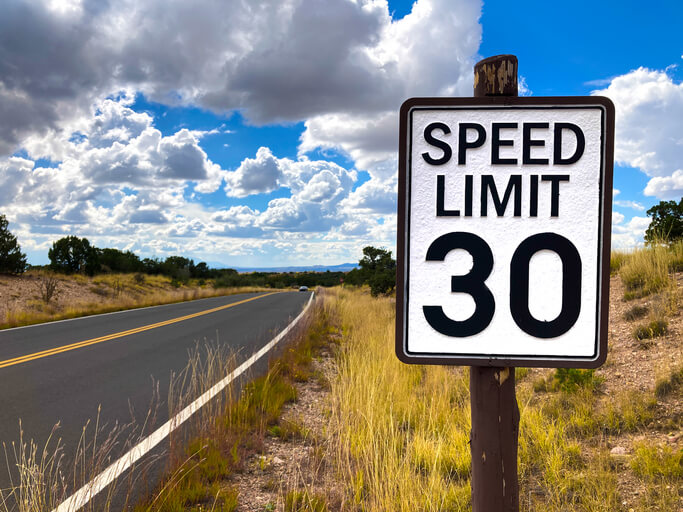Short Summary
- Traffic tickets in New Mexico can be classified as speeding, moving and non-moving violations with varying consequences.
- Consequences of traffic violations include fines, penalty assessments, points on a driving record and increased insurance premiums.
- Responding to a ticket within 15 days is essential. Potential benefits from hiring an attorney are expertise in traffic law and negotiation skills for dismissal or reduction of charges.
Types of Traffic Tickets in New Mexico
In New Mexico, traffic violations can be broadly classified into three categories: speeding tickets, moving violations, and non-moving violations. A speeding violation is one of the most common traffic offenses committed in the state, along with failing to signal, driving under the influence, and fleeing the scene of an accident.
Understanding the types of traffic tickets and their corresponding penalties can help you avoid making costly mistakes on the road. Knowing the different types of violations and their consequences can help you make informed decisions when driving.
Speeding Tickets
Speeding violations in New Mexico are categorized into two types. The first type is exceeding an “absolute speed limit” and the second type is driving in violation of the “basic speeding law”. The basic speed law mandates that drivers must exercise due care and regulate their speed to avoid collisions with persons or vehicles on or entering the highway.
Absolute speed limits are the maximum speed permissible by law on a roadway, unless otherwise indicated. Consequences for speeding tickets vary depending on the type of violation and may include fines and points on your driving record.
Moving Violations
Moving violations occur when a driver breaches traffic regulations while the vehicle is in motion, which can result in a traffic offense. New Mexico has several common offenses when it comes to driving. These include speeding, running a red light, and making an illegal turn.
Consequences of moving violations can range from fines and penalties assessments to driving record points and increased insurance premiums.
Non-Moving Violations
Non-moving violations, on the other hand, take place while the vehicle is stationary or otherwise not in motion. Examples of non-moving violations in New Mexico include inattentive driving, driving without a seatbelt, and using a cell phone while driving.
Unlike moving violations, non-moving violations are not reported to the Department of Licensing or insurance companies and are treated differently by the court and the Department of Licensing.
Consequences of Traffic Violations in New Mexico

Traffic violations can have far-reaching consequences, including:
- Points on your driver’s record
- Increased insurance premiums
- Damage to your credit score
- Dismissal from employment
Suspension of your driver’s license as a penalty for traffic violations.
It’s crucial to be aware of the potential consequences of traffic violations and take steps to avoid them.
Fines and Penalty Assessments
Fines for traffic violations in New Mexico differ depending on the specific violation. For instance, speeding tickets can range from $25 for exceeding the speed limit by 1-10 mph to $200 for exceeding the speed limit by 26-30 mph.
In addition to fines, penalties may be imposed, which are determined by the court and vary depending on the type of traffic violation. Late fees may also be levied if the payment for a traffic violation is not made in a timely manner.
Driving Record PointsInsurance Premiums
Traffic violations can result in increased insurance premiums, depending on the severity and frequency of the offenses. A minor speeding ticket may lead to a slight rise in premiums, while a major violation such as reckless driving can result in a much larger increase.
Insurance companies also consider the frequency of offenses, and multiple violations in a short time frame may lead to even higher premiums.
Responding to a New Mexico Traffic Ticket
When you receive a traffic ticket in New Mexico, it’s essential to respond promptly and appropriately. The deadline for responding is typically 15 days from the infraction date.
You have several options for responding to a traffic ticket, including paying the fine, contesting the ticket, or requesting a mitigation hearing. Failure to respond can result in additional charges.
Paying the Fine
Paying the full original ticket fine is an admission of guilt and may result in points on your driving record. To plead guilty to a traffic violation, complete and sign the back of the traffic citation and submit it, along with any applicable fees, to the court listed on the citation.
Paying the fine on the roadside will result in a conviction, and the citation will be reported to the New Mexico Motor Vehicle Division and your home state.
Contesting the Ticket
If you believe you have a valid defense for your traffic violation, you may choose to contest the ticket. Contesting a ticket requires attending a hearing to argue your case, potentially with the help of an attorney. While this option may involve more time and effort, the potential advantages include the prevention of fines, points on your driving record, and increased insurance premiums.
By contesting the ticket, you may be able to avoid the consequences of a traffic violation.
Mitigation Hearing
A mitigation hearing allows you to admit guilt but request a reduction in the fine or other penalties. To request a mitigation hearing, contact the court that issued the ticket and schedule your court date. At the hearing, the court will determine whether or not to grant your request to reduce the fine or other penalties.
Mitigation hearings are a great way to reduce the financial burden of a ticket, but it is also a great way to reduce the financial burden of a ticket.
Legal Representation for Traffic Tickets in New Mexico

Hiring an attorney for your traffic ticket in New Mexico can be a wise decision, as they can assist in avoiding fines, license suspensions, and increased insurance premiums. An attorney can provide expert legal counsel, negotiate with the prosecution, and potentially help you get the ticket dismissed or penalties reduced.
Having an attorney on your side can be invaluable in navigating the legal system and ensuring that your rights are protected.
reasons to Hire an Attorney
Some of the key reasons to hire an attorney for a traffic ticket in New Mexico include their expert knowledge of traffic laws, negotiation skills, and the potential for dismissal of charges. A lawyer can engage in negotiations with the prosecution on your behalf to attempt to have the ticket dismissed or the penalties reduced.
Their expert knowledge of traffic laws can offer valuable legal advice on how to properly address your traffic ticket.
Finding a Traffic Ticket Attorney
To find a traffic ticket attorney in New Mexico, research local lawyers, read reviews, and schedule consultations. Consider the attorney’s experience, customer service, and success rate when evaluating reviews.
To arrange a consultation, contact the attorney’s office, send an email, or book an appointment online. Be sure to bring any relevant documents, such as your driver’s license, registration, and insurance information, to your consultation.
New Mexico Traffic Laws and Regulations
New Mexico traffic laws and regulations cover a wide range of topics, from speed limits and reckless driving to major violations such as DUI or hit-and-run. These laws are in place to ensure that everyone on the road, including motorists and pedestrians, can travel safely and efficiently.
Familiarizing yourself with these laws can help you avoid traffic violations and their associated consequences.
Speed Limits
Speed limits in New Mexico vary depending on the type of road and the area. Generally, the speed limit is 65 miles per hour on highways, 25 miles per hour in residential areas, and 35 miles per hour in business districts.
It’s essential to follow posted speed limits, as well as the basic speed law, which requires drivers to adjust their speed according to weather, visibility, and traffic conditions.
Reckless Driving
Reckless driving in New Mexico is defined as operating a vehicle in a careless, inattentive, or imprudent manner, with disregard for the width, grade, curves, corners, traffic, weather, and other pertinent factors. Consequences for reckless driving can include incarceration, financial penalties, and demerit points on one’s driving record.
Engaging an attorney to represent you in court for a reckless driving charge can offer valuable legal support and potentially reduce penalties.
Major Violations
Major traffic violations in New Mexico include:
- Speeding
- Running a red light
- Failure to yield/obey traffic control devices
- Careless driving
- DUI
- Driving without registration
These violations carry substantial consequences, including financial penalties, incarceration, and license revocation.
Being aware of the potential repercussions of major traffic violations can help you make informed decisions on the road.
How Traffic Violations Affect Your Driving Record in New Mexico
Traffic violations in New Mexico can have a significant impact on your driving record. The point system assigns points for each violation, with more severe offenses resulting in more points. Accumulating too many points can lead to license suspension.
In some cases, it may be possible to remove violations from your record through defensive driving courses or expungement, depending on the type of violation and eligibility.
Point System

In New Mexico, the point system assigns points to a driver’s record for each traffic violation, with more severe offenses resulting in more points. For example:
- Speeding 6 to 15 mph over the limit results in 3 points
- Speeding 16 to 25 mph over the limit results in 5 points
- Speeding 26 mph or more over the limit results in 6 points
Accumulating points on your driving record can lead to elevated insurance premiums, license suspension, and other sanctions.
License Suspension
License suspension can occur for a variety of reasons in New Mexico, including excessive points on your driving record, major violations, or failure to appear in court. Suspension is a temporary revocation of your driver’s license, prohibiting you from operating a motor vehicle until the suspension period has elapsed.
Reinstating a suspended driver’s license requires proof of insurance, payment of any applicable fines or fees, and completion of a safety course approved by the Traffic Safety Bureau.
Removing Violations From Your Driving Record
Removing violations from your driving record in New Mexico may be possible through a defensive driving course or expungement, depending on the type of violation and eligibility. To complete a defensive driving course, obtain permission from the court and enroll in a driving school, then submit your certificate of completion upon finishing the course.
License points are expunged from the driver’s record 12 months following the violation date.
Summary
Understanding traffic laws and regulations in New Mexico is crucial for maintaining a clean driving record and avoiding the negative consequences of traffic violations. From speeding tickets to major violations, this guide has provided you with valuable information to help you navigate the complex world of traffic laws and regulations. By being aware of the types of traffic tickets, consequences, and options for responding, you can make informed decisions on the road and protect yourself and others from potential hazards.
Frequently Asked Questions
How does New Mexico handle out of state tickets?
New Mexico citations will be reported to your home state and posted to the Interstate Data Base, costing you points on your driving record.
How much is a speeding ticket in New Mexico?
A speeding ticket in New Mexico will cost you approximately $90-$150, depending on the severity of the offense.
What happens if you don’t pay a speeding ticket in New Mexico?
If you don’t pay your New Mexico speeding ticket, you may have a warrant out for your arrest and your driver’s license could be suspended.
What are the most common traffic violations in New Mexico?
Speeding, failing to signal, driving under the influence, and fleeing the scene of an accident are some of the most frequent traffic violations committed in New Mexico.
These violations can lead to serious consequences, including fines, license suspension, and even jail time. It is important for drivers to be aware of the laws and regulations in their state and to obey them at all times.
Drivers should drive safely.
Can I remove a traffic violation from my driving record in New Mexico?
It is possible to remove a traffic violation from your driving record in New Mexico through a defensive driving course or expungement, depending on the type of violation and eligibility.
For defensive driving courses, the court may allow you to take a course to reduce or dismiss the violation. The course must be approved by the court and taken within a certain time frame.
Different States Speeding Ticket
- Alabama Speeding Ticket
- Virginia Speeding Ticket
- Explore the ins and outs of Texas Driving Records – Read more at Texas Driving Records: Everything You Need to Know.
- Curious about red light ticket fines in New York? Explore our guide on ‘How much is a Red Light Ticket in New York?‘ to understand typical penalties and related information.
- Stay safe on the road Avoid Blind Spots and Truck No-Zones

 Live Chat
Live Chat






